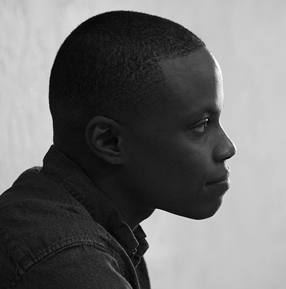Trans Study: Untitled 4 (Facial Expression)
Upon first glance, it is difficult to decipher a figure, much less a facial expression. Upon first glance, it is difficult, the figure. Upon first glance, there is no face. Upon first, undecipherable, the glance. It is difficult. It depends on who is looking. We might say: Upon first glance, we are in a dark room. We are behind our eyelids in the room. We are looking, in the dark. The figure before us is also behind the eyelids, their eyelids. It is as if neither we nor they are present to the other, though we are, looking, together, in and from the dark. We look to work out the other’s intentions. We cannot. We look. We breathe together inside the room inside. The figure, having been exposed, overexposed, to light has become like a shadow or a barely lit shape on the midnight lake. For the sake of simplicity, we could call the figure a man, but I will not. We are in the room that precedes all that. The cleavage of this from that. It goes: first darkness, then form. Remember that. Try. If we look too long at the lake what surfaces is the old thought—when I was a child, when I was a child—we are thrown back to before, not shame, but shame of shame. We become furious and wild-limbed and kind. We pass the clause between us, a rope tethering, tethering, taut. A poem, we’ve been taught, though we can’t say where, should leave this part out. We should rush from room to bright room so that we can be surprised by what we find. But the figure is still in the dark. They require our stillness. Our black breath. I am afraid, I say to no one, to be like this image. Upon first glance, unreachable. Exposed. When I was a child, there was a figure in the dark. A man. Let’s call him that. A man. I was a question. I was a question he answered. I was a question he held and demanded my stillness. Part of me lives in that room, still, though I left it with a new, wretched name. But—and I can say this now—he saw me, the man in the dark, when no one else could see me. When I was, in manner of speaking, difficult to decipher. A darkness before form. He held me. Stilled me. He brought me into the frame. We were two black men there, in the black, the close black, the black from which life, relentlessly, comes. The breath between us was cruel. But I could see him. Him. I could see the sorrow, the rage, the calm water, the father raising his fist, the unnamable quiet of his face.
Commissioned by the Guggenheim Museum as part of the 2023 Poet-in-Residence. Reprinted with permission of the poet.
“I was taken by this image at once, but I could not quite say why. Something about the black figure rising from the black surface and the near perfect opacity and self-contained stance of the figure who nonetheless drew me in. In this poem, I tried to capture in language what it means to be ‘taken’ by an image, beginning with a contemplation of the framing text, arranging it, and rearranging it in order to try to interpret the image. But, I find, this activity of interpretation gives way to sitting with the image itself, looking at it from a distance, from many angles at once. And, finally, the image takes me into it and then into myself, the private room of my memory which has all along been shaping my encounter with the image, just below my awareness. What I found there was a story about another black figure who, emerging from the dark, ‘took me,’ a story there’s no need to be too specific about. But this image let me feel something new about that old scene, something like tenderness.”
—Cameron Awkward-Rich

